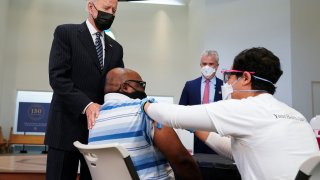
- The Biden administration is preparing for the potential need for Covid-19 vaccine booster shots, though nothing is certain, a top U.S. official said Friday.
- "Requiring additional shots in the future is obviously a foreseeable potential event," Andy Slavitt, senior advisor to President Joe Biden's Covid response team, told reporters.
- In comments that aired Thursday, Pfizer CEO Albert Bourla said people will "likely" need a third dose of a Covid-19 vaccine within 12 months of getting fully vaccinated.
The Biden administration is preparing for the potential need for Covid-19 vaccine booster shots, though nothing is certain, a top U.S. official said Friday.
"Requiring additional shots in the future is obviously a foreseeable potential event," Andy Slavitt, senior advisor to President Joe Biden's Covid response team, told reporters during a press briefing Friday. "I want to emphasize that while there is certainly speculation about this, that is far from saying that is what's going to happen."
Should Americans require booster shots, the U.S. government would likely need to make arrangements with the drugmakers to supply additional doses and make plans for vaccine distribution.
Get Tri-state area news delivered to your inbox.> Sign up for NBC New York's News Headlines newsletter.
Slavitt said Friday the administration has thought about the need to secure additional doses.
"I can assure you that when we do our planning, when the president orders purchases of additional vaccines as he has done and when we focus on all the production expansion opportunities that we talk about in here we very much have scenarios like that in mind," he said.
Pfizer CEO Albert Bourla, in comments that were aired for the first time Thursday, said people will likely need a third dose, or booster shot, of a Covid-19 vaccine within 12 months of getting fully vaccinated. Bourla also said it's possible people will need to get vaccinated against the coronavirus annually, like for the seasonal flu.
Money Report
"A likely scenario is that there will be likely a need for a third dose, somewhere between six and 12 months, and then from there, there will be an annual revaccination, but all of that needs to be confirmed. And again, the variants will play a key role," he told CNBC's Bertha Coombs during an event with CVS Health.
"It is extremely important to suppress the pool of people that can be susceptible to the virus," he added.
Pfizer and Moderna have both said their two-dose Covid-19 vaccines, which use similar technology, remain highly effective six months after the second dose. However, researchers still don't know how long protection against the virus lasts after six months of being fully vaccinated, though health experts do expect protection to wane after some time.
On Thursday, the Biden administration's Covid response chief science officer, David Kessler, said Americans should expect to receive booster shots to protect against coronavirus variants. He told U.S. lawmakers that currently authorized vaccines are highly protective but noted new variants could "challenge" the effectiveness of the shots.
"We don't know everything at this moment," he told the House Select Subcommittee on the Coronavirus Crisis.
"We are studying the durability of the antibody response," he said. "It seems strong, but there is some waning of that, and no doubt the variants challenge ... they make these vaccines work harder. So I think for planning purposes, planning purposes only, I think we should expect that we may have to boost."
Moderna CEO Stephane Bancel told CNBC on Wednesday that the company hopes to have a booster shot for its two-dose vaccine available in the fall.






